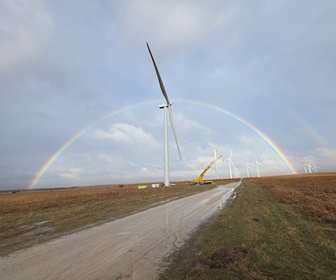Rocks in the seabed off the UK coast could provide long-term storage locations for renewable energy production, new research suggests. Engineers and geoscientists from the Universities of Edinburgh and Strathclyde used mathematical models to assess the potential of the process, called compressed air energy storage (CAES).
CAES would work by using electricity from renewables to power a motor that generates compressed air. This air would be stored at high pressure in the pores found in sandstone, using a deep well drilled into the rock. During times of energy shortage, the pressurised air would be released from the well, powering a turbine to generate electricity that is fed into the grid. Locating wells close to sources of renewable energy – such as offshore wind turbines – would make the process more efficient, cheaper and reduce the amount of undersea cables required, the team says. The study was funded by the Engineering and Physical Science Research Council, Scottish Funding Council, and the Energy Technology Partnership.









